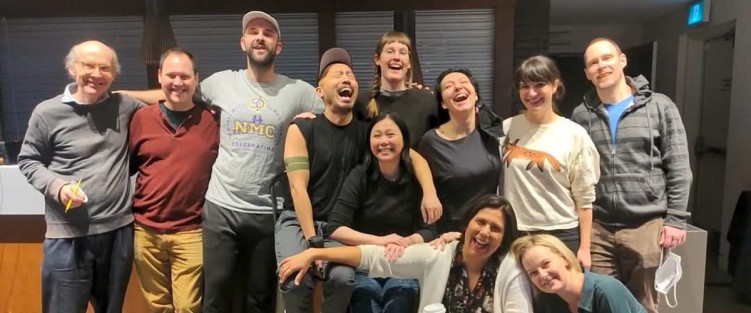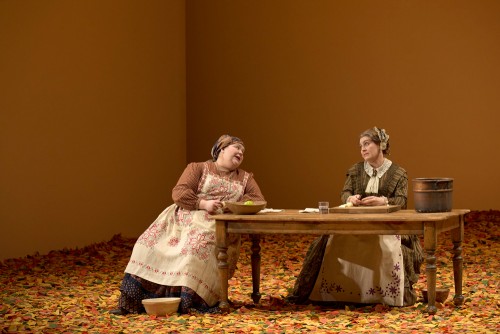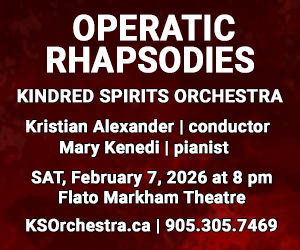Exemplary Art
Because Art makes a profound impact, artists have an equivalent responsibility in all the various roles they play during their careers: as performers, producers, creators, leaders, educators, and public figures. A strong work ethic, a commitment to the art form in all its intricate details, a deep sense of empathy, and the desire to communicate and sincerely connect with others – all these are characteristics of exemplary art. And the two artists featured here, conductor David Fallis and mezzo-soprano Krisztina Szabó, are among the most highly respected practitioners of classical music in Canada.
David Fallis’ musical expertise spans from the Medieval, Baroque and Classical periods to current contemporary repertoire, often premiering new works and championing Canadian composers. He was at the helm of Toronto Consort from 1990 to 2018; as Music Director for Opera Atelier, he recently conducted Charpentier’s David and Jonathan in April of this year, as part of the company’s celebratory 40th season; and he also frequently collaborates with Soundstreams, conducting Choir 21, a vocal ensemble specializing in contemporary choral music. Fallis is often instrumental in guiding singers through unconventional and challenging repertoire, as I have discovered working with him through several projects. Once again I look forward to working under his direction, tackling Claude Vivier’s music, along with other avant-garde vocal pieces, in Soundstreams’ remount of Love Songs, part of their 2025/26 season.
Krisztina Szabó and I also crossed paths initially through Soundstreams: in an opera workshop. I eventually had the great fortune of singing with her in one of their main stage productions, Airline Icarus (music by Brian Current, libretto by Anton Piatigorsky). Her warm and lush voice is equally at home with Bach’s St. John Passion and Bartók’s opera Bluebeard’s Castle. She recently performed in the Canadian Opera Company’s productions of Wozzeck (Berg) and Eugene Onegin (Tchaikovsky). At the upcoming International Congress of Voice Teachers (ICVT), taking place July 31 to August 3, in Toronto, we will cross paths again.
She will moderate a plenary session called “Our Voices Alive – Our Voices Uplifted,” featuring an inspiring panel of Canadian artists – Ian Cusson, Alice Ping Yee Ho, Britta Johnson, Teiya Kasahara, and Cecilia Livingston – while I will offer my own presentation, entitled Charting a Course in Mindfulness, which promotes having conversations about music and mindfulness, the way the artists in this series, including David and Krisztina, have done, opening up about their mindful processes and approaches to discovering and making music.
In their respective interviews, both artists stressed similar themes: the maintenance of good health and self-awareness; of being able to analyze how one learns and functions best; and the importance of preparation and accountability in every aspect of life as a performing artist – as a leader, an educator and a teammate.
As with previous participants in this series, their full interviews are available on the YouTube channel Vania Chan Music. What follows here are some of their insights, drawn from the interviews, into three fundamental precepts of mindfulness.
Calming the Mind:
David: I find that it’s important to get a good night’s sleep if I can, which I do by making sure that I have routines, not working to the last minute and expecting to “turn off.” This is always a challenge for a musician; because of course, you’re often performing at night. I do like walking a great deal. I find walking a kind of meditative activity. Even just going for a walk, not going anywhere in particular, trying a different route. Sometimes that’s a good thing to do before going to bed. I’ll go for a walk, even for just ten or fifteen minutes.
Krisztina: Being attuned to my body’s needs has been a great way to calm my mind. The body responds to regularity. A consistent bed time is very important, a certain number of hours of sleep, hydration, and regular meals. I like to set up my environment nicely with what makes me feel good– lights, flowers, candles. Before performances, I like solitude to really centre myself. If there’s too much stimulus it takes me out of my body. I really like to have that quiet time for myself, thinking about the role, talking myself through it, mentally going through it.
Organizing Thoughts:
David: I try to put myself in the composer’s position – what were they trying to express on the page? Sometimes I find contemporary music a bit like a puzzle. You need to work with it, look at it a number of times, and come back to it the next day. We were doing another piece by Murray Schafer, and some of the pitches seemed very unusual. I looked at it enough to know that the pitches all fit within a kind of scale. And so, we learned that scale as an exercise, so that you got a sense of where there are tones, semitones, thirds, and so on. The singers had in their minds’ ear that there was a pattern to it… a little key that unlocks the puzzle…and then…practice!
Krisztina: I always take a score and flip through it, assess, and see how it’s structured, where the challenges are going to lie, and then I get a little plan “of attack” together. I work very methodically, from beginning to end, scene by scene, repetition ad nauseam. I do play the piano, enough that I can play some of the score myself, so that I know where I fit into the harmonic landscape. I have encouraged my students to have a practice journal, to self-assess. It is a process that I’m guiding them through, but it’s going to be about what works for them, their voices, and their life circumstances.
Flow:
David: The idea is concentration on the task at hand, and momentarily forgetting everything else. As a conductor, you are both leading but also making sure that you’re listening. Once in a while I have to make sure that I’m listening almost dispassionately, as if I’m a listener from the outside - hearing things that aren’t together, or things that aren’t in tune. You have to be aware of the sounds around you. Sometimes I will say – this time, I’m going to quite deliberately hear the tenor line or the bass line or the viola part. In a performance, you give all of yourself. But in rehearsal, as a conductor, you have the responsibility to be “the ears.”
Krisztina: I am happiest when I’m working my way through a new score. The process of learning and of rehearsing the role with others is my favourite. For me, the entire process leading up to the performance is what I love the most – that sense of discovery, connection, of being super-present when you’re learning things. Mindfulness is constantly evolving because we’re constantly evolving. What it looks like in your twenties is not what it looks like in your thirties, your forties. You really need to stay tuned into what your needs are, and be okay that they’re going to change, not being rigid about that…really just going with the “flow.”
Author and creator of this series, Vania Chan is a lyric coloratura soprano, artist researcher and educator. Visit her website at www.vaniachan.com to learn more about upcoming projects.






